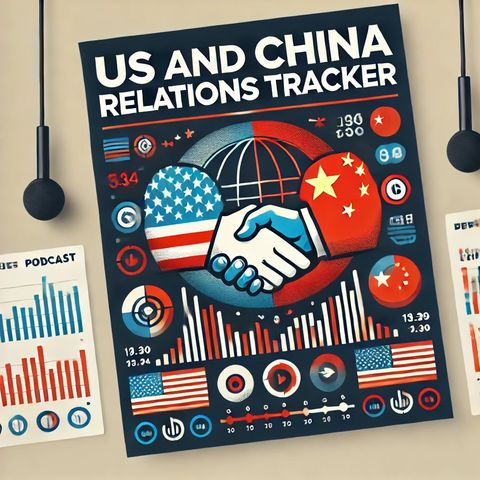"Navigating the Cooperative Potential Amid US-China Rivalry: Mearsheimer's Insights"

Download and listen anywhere
Download your favorite episodes and enjoy them, wherever you are! Sign up or log in now to access offline listening.
"Navigating the Cooperative Potential Amid US-China Rivalry: Mearsheimer's Insights"
This is an automatically generated transcript. Please note that complete accuracy is not guaranteed.
Description
John Mearsheimer, a distinguished political science professor at the University of Chicago, highlights the dynamic nature of US-China relations where cooperation remains possible despite underlying competition. In an exclusive interview...
show moreHistorically, US-China relations have oscillated between phases of cooperation and competition, significantly shaping international geopolitics and economic landscapes. In recent years, this relationship has been marked by escalating tensions over trade issues, technological advancements, and military presence in the Asia-Pacific region. Nevertheless, Mearsheimer believes there is room for collaboration, particularly in addressing global challenges such as climate change, public health crises, and nuclear proliferation.
Mearsheimer underscores that while competition is inherent to the nature of international politics, it does not preclude opportunities for constructive engagement. He argues that both nations stand to benefit from a cooperative framework that emphasizes mutual understanding and dialogue. This perspective aligns with the sentiments of various international leaders who advocate for a balanced approach to managing US-China relations.
Additionally, the contemporary global environment presents unique challenges that require collaborative solutions. Climate change, with its far-reaching and potentially catastrophic impacts, demands cooperation on a scale unprecedented in human history. As the world's largest economies and biggest carbon emitters, the US and China have both the responsibility and capability to lead global efforts in reducing emissions and fostering sustainable development.
Public health, too, is a domain where US-China cooperation has shown promise. The COVID-19 pandemic underscored the need for joint research initiatives, information sharing, and coordinated responses to global health emergencies. Drawing on shared scientific resources could enhance preparedness and response strategies for future pandemics, ultimately benefiting global health security.
Moreover, nuclear non-proliferation remains a critical area for potential cooperation. Both the US and China possess considerable influence in international arenas such as the United Nations and have a vested interest in maintaining global stability. Through dialogue and negotiation, they can work together to address the proliferation risks posed by countries like North Korea and Iran, thus contributing to a safer world.
Despite these opportunities, Mearsheimer warns that managing the competitive aspects of the relationship will require strategic foresight and diplomatic acumen. Areas of contention, such as Taiwan, the South China Sea, and technological dominance, will continue to test the limits of cooperation. The challenge lies in balancing national interests with the broader imperative of maintaining international peace and stability.
In summary, the complex tapestry of US-China relations is woven with threads of both competition and cooperation. By focusing on shared interests and fostering open communication, there is the potential to transform a dynamic that is often characterized by rivalry into one marked by strategic partnership. As Mearsheimer's insights reveal, the path forward necessitates a careful blend of realism and optimism, aiming for a pragmatic yet hopeful future in global relations.
Information
| Author | QP-4 |
| Organization | William Corbin |
| Website | - |
| Tags |
Copyright 2024 - Spreaker Inc. an iHeartMedia Company

Comments